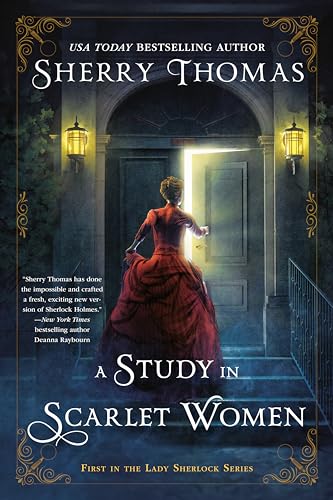Charlotte Holmes is a young gentle woman who has no interest in following Victorian society's, or her parents' for that matter, strictures and expectations about a woman's behaviour and a future that can only result in marriage. She is incredibly intelligent and impressively observant and she wants to use her sharp, deductive mind for something other than running a household and family. So she takes the most likely way to set herself outside of polite society and gets herself truly, completely, irrevocably ruined. And she does it in a dispassionate, deliberate way, setting herself free to make her own way in life. The circumstances and aftermath of her ruin cast suspicion on her family though when one of the people involved is found dead. This death is the third unexpected death in a very short time and Charlotte must figure out who the murderer could possibly be to exonerate her sister and father. Of course, she cannot do this under her own name but she can as the sister to the entirely fictional Sherlock Holmes, a persona she created to previously help the police solve cases.
As the first in a series, this novel spends quite a while on building the world of the story. Set in Victorian England, this means there are a great many fascinating historical details to weave in in order to make it believable for the time. The murders and the investigation of such, which is mostly done by the police inspector rather than Charlotte, are not necessarily as prominent as in many mysteries but the social commentary that is foregrounded is incredibly important to Charlotte's story and to the formal invention of her Sherlock. Charlotte is not simply Conan Doyle's Sherlock Holmes made female. She retains many of his original traits but she is also softened and humanized some as well. Her close relationship with her sister Livia and her childhood friend Lord Ingram, to whom she is also attracted, as well as her developing friendship with the former actress, the widowed Mrs. Watson are proof of just one of the differences. In many of Charlotte's social interactions, she comes across as if she might be on the spectrum while in others she seems more just a naive, sheltered young woman of a certain social class. Both of these things being true would explain some of the seeming inconsistencies in her character. When she explains her conclusions each time and the reader has a chance to witness her deductive reasoning, it is fascinating and although this is not the sort of whodunit where the reader too can be solving the mystery (too much information not shared until Charlotte explains how it led her to her solution), it is no less entertaining for that lack. The reason for the three deaths came fairly late in the game and the end wrapped things up a little too quickly with a touch of deus ex machina but the wealth of historical details and the way in which the plight of women, from upper classes to the demi-monde, were integral to the story made this an engaging read indeed.



No comments:
Post a Comment
I have had to disable the anonymous comment option to cut down on the spam and I apologize to those of you for whom this makes commenting a chore. I hope you'll still opt to leave me your thoughts. I love to hear what you think, especially so I know I'm not just whistling into the wind here at my computer.